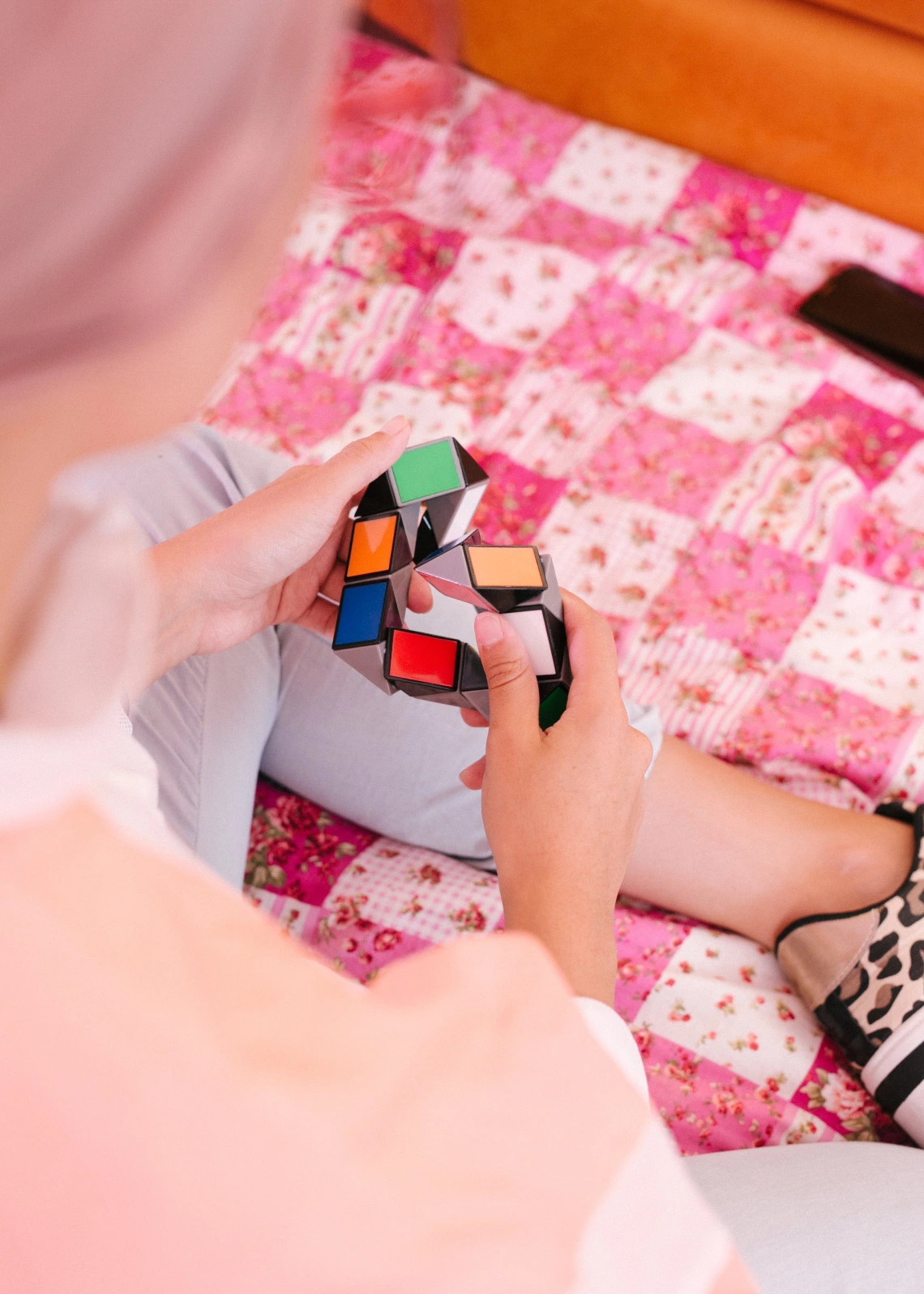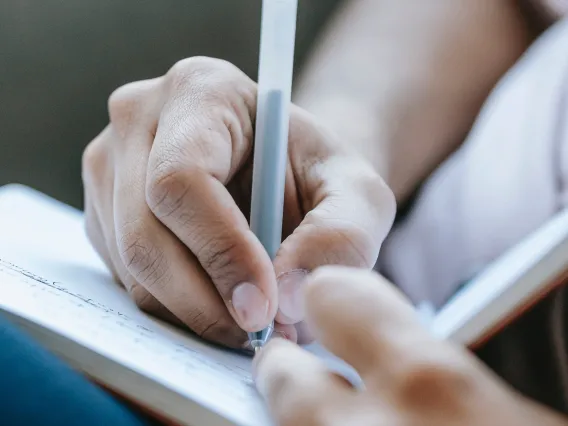Empower Yourself
Healthy coping skills improve wellbeing, get us through challenging times, and leave us feeling capable and in control.

How You Cope Matters
When used consistently, healthy coping strategies have long-term benefits like better health, problem-solving, and emotional balance. Coping skills are healthiest and most effective when they help us adapt to change and build resilience over time.
Are Your Coping Skills Healthy for You?
Everyone's needs and preferences are different. What's helpful for someone else may not be helpful for you, or there may be times when you need to try out a new coping skill.
Here are a few ways you can tell if your coping skills are healthy for you:
Emotional Balance
Rather than bottling up our feelings or getting overwhelmed, healthy coping skills help us name and experience our feelings in a balanced way.
Problem-Solving & Skill-Building
Healthy coping skills can help us identify and address root problems, look for solutions, and build essential skills.
Sustainability
Healthy coping skills are actions or habits that we can include in our daily lives and continue to find beneficial in the long run.

150+ Coping Skills Ideas
Pick and choose from the categories below to create a personal coping skills menu.
Counselor tip: Make a list of at least ten coping skills, take a short break, and come back to highlight your top three. Collect any items you would need ahead of time and keep them someplace easy to find. Try to use these three coping skills at least once in the next week. You can keep building from there.

Do Things You Enjoy
Things you enjoy and creative outlets give you a chance to escape, recharge, and fuel up on positive emotions. Doing things you enjoy is a healthy distraction and a way to channel your energy into something positive for you.
Try these coping skills:
- listen to uplifting music
- play with a pet
- start or practice a hobby
- learn a new skill you've always wanted to try
- do something just because it's fun
- do something just because it feels good
- read a fiction book in your favorite genre
- explore a new genre of movies or books
- listen to a funny podcast
- listen to an audiobook
- find a creative outlet
- plan three things to look forward to in the next week
- use humor or laughter
- play a board game
- learn a new card game
- make something from scratch
- watch a video about your favorite hobby
- share a hobby with a friend

Create a Healthy Lifestyle
Healthy daily habits can help you feel like a superhero during times of stress. They boost your physical health, immune response, mental health, and all-around resilience. Give yourself variety and take a holistic view of your wellbeing as you develop your healthy lifestyle.
Try these coping skills:
- prioritize self-care
- limit substance use
- complete a free Personal Wellness Plan
- take care of your mental health
- schedule “me time”
- cook a meal for yourself
- pack a healthy snack for the day
- move your body
- take short breaks during the day
- try yoga
- try 10 minutes of tai chi or qigong
- take care of your physical health
- get your annual check up
- take a mini nature break
- take stretch breaks while studying
- take time to enjoy a favorite food or drink
- take a break from screen time
- reduce caffeine use
- get 7-9 hours of sleep every night
- practice healthy sleep hygiene
- try meditation or grounding techniques
- learn your stress and anxiety tells, triggers, and glimmers

Change Your Perspective
Changing your perspective is like giving your mindset a makeover. To shift your perspective, look at the same situation from different angles, pay extra close attention to the positives, and take a step back to remember what matters most to you in life.
Try these coping skills:
- write down 3 of your recent successes or achievements
- practice acceptance by saying, "This is what happened, and I don't have to judge it or myself."
- develop a spiritual practice
- practice positive self-talk
- create a personal affirmation
- imagine how someone you admire might look at a stressful situation
- reframe challenges or failures
- read a helpful nonfiction book
- learn your personal strengths
- practice gratitude: what are three things that you appreciate right now?
- practice optimism: what are three things you're looking forward to in the next week, month, or year?
- create a vision board
- make a list of your most important values
- make a list of your vision for your future
- give yourself a short distraction break when you're overthinking
- learn about negative thinking patterns
- limit exposure to negative news
- reflect on past successes
- connect with your spiritual beliefs
- focus on the present moment
- practice self-acceptance
- talk to yourself like you'd talk to a friend
- practice empathy
- look for the glimmers of hope
- look for something to laugh about
- try a positive psychology activity
- read or listen to a memoire of someone you look up to
- learn about other people's life journeys
- start a journal

Express Your Feelings
Giving your thoughts and feelings a voice provides self-awareness and a healthy emotional release. By taking the time and space to express your feelings, you also set yourself up for better problem-solving, connection with others, and stress management.
Try these coping skills:
- write a bullet list of your thoughts and feelings
- talk about your feelings with someone you trust
- give yourself a 10-minute venting session
- try guided journal prompts
- reach out for professional mental health support
- give yourself the time and space to cry
- create a playlist of empowering songs
- watch an inspiring movie
- watch a comforting show
- tell someone, "Thank you."
- tell someone, "I'm sorry."
- tell someone that you care about them
- hug someone you trust
- tell someone you forgive them
- send a heartfelt text
- find a creative outlet for your feelings
- practice deep breathing
- practice naming your emotions
- move your body to release pent up energy and emotion

Connect with Others
Connection is an essential element of our wellbeing. It offers us emotional support, a sense of belonging, and opportunities to bond. Having other people in our lives also helps us get through difficult times by giving us a fresh perspective and a helping hand. Researchers have found that healthy social connections boost our mental and physical health too.
Try these coping skills:
- check in with a friend
- tell a friend how you're feeling
- tell a friend a funny story
- ask for help
- help a friend
- spend quality time with someone
- cook a meal for friends
- plan a social event
- talk with someone supportive
- find or start a community of like-minded people
- volunteer
- perform a random act of kindness
- build a social support network
- join a book club or social group
- host a movie or board game night
- explore the community with a friend

Organize, Prioritize, and Problem-Solve
When life gets complicated, organizing, prioritizing, and problem-solving can give you clearer thinking and help you keep a proactive approach. The best part is, feeling more capable and organized creates a positive feedback loop. Small victories build confidence and motivation for tackling the larger challenges that may lie ahead.
Try these coping skills:
- create a to-do list
- schedule time for self-care
- schedule time for problem-solving
- use a planner or calendar
- put at least one next step in a stressful situation into your calendar
- research a problem
- break down problems into smaller parts
- make a list of questions you can find the answer to
- make a list of possible solutions for a stressful/challenging situation
- clean or organize one space where you work or live
- do one thing to expand your comfort zone
- practice a new skill that will help make a challenging situation easier
- ask a mentor for advice
- set healthy boundaries
- create a daily routine
- try the Pomodoro time management technique
- set a SMART goal: specific, measurable, achievable, realistic, and timely
- do something you've been procrastinating
- donate to a food bank
- donate old clothes
- evaluate your goals, priorities, and expectations
- do a digital detox
- practice problem-solving skills
- take a break from social media
- set up a comfortable work space
- try time blocking

Relax Your Body and Mind
Relaxation is like a reset button. It gives you a chance to slow down and come back stronger. This is great for focus and productivity, keeping your body and mind healthy, getting better sleep, and feeling better all around.
Try these coping skills:
- meditate
- visualize yourself in a calm place
- take a 5-minute break to take your mind off of a stressful situation
- do something soothing or relaxing
- listen to calming music
- take 5 minutes to breathe
- give yourself space when you need it
- turn on music and move with it however you like
- get a coloring book
- make a collage
- take a warm bath or long shower
- take a break in nature
- practice aromatherapy
- light a candle
- try binaural beats or sound technology for focus, relaxation, or sleep
- give yourself a hand, face, or foot massage
- get a massage
- try grounding exercises
- count to 10 before reacting
- use a stress ball or fidget toys
- create a calm space for yourself
- play brain games or work on a puzzle
- go stargazing
- breathe fresh air
- use a stress-reducing app
Set Goals, Evaluate, and Adjust
As you build your coping skills toolbox, it's important to set goals, check in with yourself, and adjust along the way. These three elements help us become more proactive, develop personal insights, and get the most benefit from our coping skills. Goal-setting and self-assessment skills will make you a lifelong learner and contribute to your long-term wellbeing.

How to Set Coping Skills Goals
To begin, assess where you are and what you want to achieve. What are your current challenges, triggers, or stressors? What do you know works for you? What do you want to achieve? Why is this important?
Consider the actionable steps you feel ready and able to take and set at least one meaningful and realistic goal.

How to Evaluate Your Coping Skills
Check in with yourself at regular intervals, whether that's a set time every day, every week, or every few weeks. This is great for self-care and helps you pay closer attention to how your coping skills are working.

How to Adjust Your Coping Skills
Maintain a curious mindset and remember why you've set your coping skills goals. To fine-tune your coping plan, consider where you need more variety, support, or resources and make small, sustainable changes.

